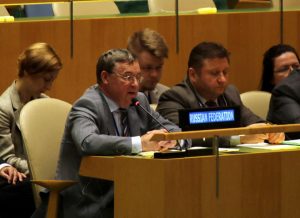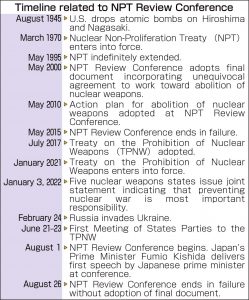After isolated Russia upends consensus, NPT Review Conference ends in failure, exposing passive stance of nuclear weapons states
Aug. 28, 2022
by Kana Kobayashi, Staff Writer
New York — The Nuclear Non-Proliferation Treaty (NPT) Review Conference, held amidst Russia’s invasion of Ukraine, ended in failure on August 26. Despite working to avoid the second straight conference breakdown, member nations and regions were unable to resolve their disagreements with Russia despite making a number of concessions in the creation of a draft final document. Any stalemate in nuclear disarmament without eliminating the threat of nuclear weapons would be intolerable.
Conference President Gustavo Zlauvinen, from Argentina, indicated that only one nation participating in the negotiations had objected to the draft final document at the review conference’s concluding plenary session, which began nearly four-and-a-half hours behind schedule at the United Nations headquarters meeting venue in New York City. With a stern expression, Mr. Zlauvinen reported on the results of the negotiations concerning the draft final document. Before the plenary session began, the atmosphere had been collegial, with member-state delegations snapping commemorative photographs in front of the podium. Thereafter, the situation shifted, however, and a gloom descended on the venue.
According to several diplomatic sources, a majority of the member states indicated their approval for the draft final document, and in the morning of August 26, an air of optimism permeated the air. In the draft amended on August 25, the wording that referenced “Russia” had been deleted from a paragraph calling for the return of control back to Ukraine of the Zaporizhzhia nuclear power plant, located in southern Ukraine. Russia is believed to have been fiercely opposed to that demand. The general impression was that those in the conference president’s camp felt optimistic that a consensus could be reached.
At the last moment, around noon on August 26, Russia’s delegation conveyed its stance to Mr. Zlauvinen that Russia could not agree to the draft unless significant changes were made to the wording concerning the Ukraine nuclear power plant, now occupied by the Russian military. The diplomatic sources described the situation akin to “the bottom falling out.” The negotiation efforts in which the president and his allies were engaged ultimately failed to bear fruit.
In the plenary session, the part of the conference that led to the breakdown, representatives of the participating countries again voiced their opinions in what amounted to a rehash of the previous four weeks of discussions. A Russian representative spoke emphatically about how unfortunate it was that the draft final text, designed to reflect the stances of all countries and strike a balance among them, had failed to meet that standard.
In response, the United States voiced its condemnation by stating its view that Russia was the reason a consensus had not been reached and that the changes Russia demanded were an attempt to conceal that country’s plan to eliminate Ukraine. Saying that Russia’s isolation was clear for all to see, Ukraine also denounced Russia. When Ukraine expressed its gratitude to countries that had been providing support to Ukraine, applause broke out in a sign of solidarity, symbolizing the conflicted views about the Ukraine situation in the international community.
The unanticipated problem of Russia’s invasion of Ukraine earlier this year in February seemed to hamper any consensus among the roughly 190 countries and regions. Nevertheless, the negotiations surrounding the draft final document exposed the regressive stance of nuclear weapons states with respect to nuclear disarmament.
With regard to the Treaty on the Prohibition of Nuclear Weapons (TPNW), with its aim of comprehensively banning nuclear weapons, the draft text merely mentioned that the TPNW had entered into force. The numerical targets and deadlines for nuclear disarmament did not meet the demands called for by non-nuclear weapons states. The previous review conference, held in 2015, also ended in failure because the United States, itself a nuclear nation, opposed the draft final document, citing issues concerning the Middle East.
At the recent plenary session, Mexico’s delegation declared on behalf of the TPNW member states that progress would be made with firm determination for the survival of humanity in a world facing catastrophic risk posed by nuclear weapons. Next year, international negotiations for the elimination of nuclear weapons include the first meeting of the preparatory committee for the next NPT Review Conference and the second meeting of States Parties to the TPNW.
(Originally published on August 28, 2022)
New York — The Nuclear Non-Proliferation Treaty (NPT) Review Conference, held amidst Russia’s invasion of Ukraine, ended in failure on August 26. Despite working to avoid the second straight conference breakdown, member nations and regions were unable to resolve their disagreements with Russia despite making a number of concessions in the creation of a draft final document. Any stalemate in nuclear disarmament without eliminating the threat of nuclear weapons would be intolerable.
Conference President Gustavo Zlauvinen, from Argentina, indicated that only one nation participating in the negotiations had objected to the draft final document at the review conference’s concluding plenary session, which began nearly four-and-a-half hours behind schedule at the United Nations headquarters meeting venue in New York City. With a stern expression, Mr. Zlauvinen reported on the results of the negotiations concerning the draft final document. Before the plenary session began, the atmosphere had been collegial, with member-state delegations snapping commemorative photographs in front of the podium. Thereafter, the situation shifted, however, and a gloom descended on the venue.
According to several diplomatic sources, a majority of the member states indicated their approval for the draft final document, and in the morning of August 26, an air of optimism permeated the air. In the draft amended on August 25, the wording that referenced “Russia” had been deleted from a paragraph calling for the return of control back to Ukraine of the Zaporizhzhia nuclear power plant, located in southern Ukraine. Russia is believed to have been fiercely opposed to that demand. The general impression was that those in the conference president’s camp felt optimistic that a consensus could be reached.
At the last moment, around noon on August 26, Russia’s delegation conveyed its stance to Mr. Zlauvinen that Russia could not agree to the draft unless significant changes were made to the wording concerning the Ukraine nuclear power plant, now occupied by the Russian military. The diplomatic sources described the situation akin to “the bottom falling out.” The negotiation efforts in which the president and his allies were engaged ultimately failed to bear fruit.
In the plenary session, the part of the conference that led to the breakdown, representatives of the participating countries again voiced their opinions in what amounted to a rehash of the previous four weeks of discussions. A Russian representative spoke emphatically about how unfortunate it was that the draft final text, designed to reflect the stances of all countries and strike a balance among them, had failed to meet that standard.
In response, the United States voiced its condemnation by stating its view that Russia was the reason a consensus had not been reached and that the changes Russia demanded were an attempt to conceal that country’s plan to eliminate Ukraine. Saying that Russia’s isolation was clear for all to see, Ukraine also denounced Russia. When Ukraine expressed its gratitude to countries that had been providing support to Ukraine, applause broke out in a sign of solidarity, symbolizing the conflicted views about the Ukraine situation in the international community.
The unanticipated problem of Russia’s invasion of Ukraine earlier this year in February seemed to hamper any consensus among the roughly 190 countries and regions. Nevertheless, the negotiations surrounding the draft final document exposed the regressive stance of nuclear weapons states with respect to nuclear disarmament.
With regard to the Treaty on the Prohibition of Nuclear Weapons (TPNW), with its aim of comprehensively banning nuclear weapons, the draft text merely mentioned that the TPNW had entered into force. The numerical targets and deadlines for nuclear disarmament did not meet the demands called for by non-nuclear weapons states. The previous review conference, held in 2015, also ended in failure because the United States, itself a nuclear nation, opposed the draft final document, citing issues concerning the Middle East.
At the recent plenary session, Mexico’s delegation declared on behalf of the TPNW member states that progress would be made with firm determination for the survival of humanity in a world facing catastrophic risk posed by nuclear weapons. Next year, international negotiations for the elimination of nuclear weapons include the first meeting of the preparatory committee for the next NPT Review Conference and the second meeting of States Parties to the TPNW.
(Originally published on August 28, 2022)









